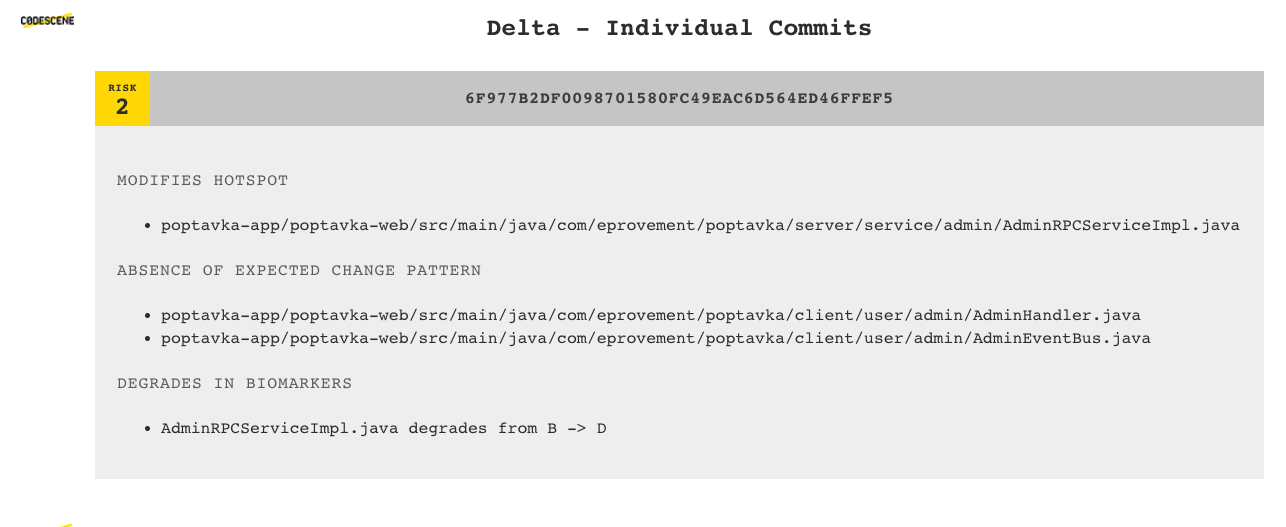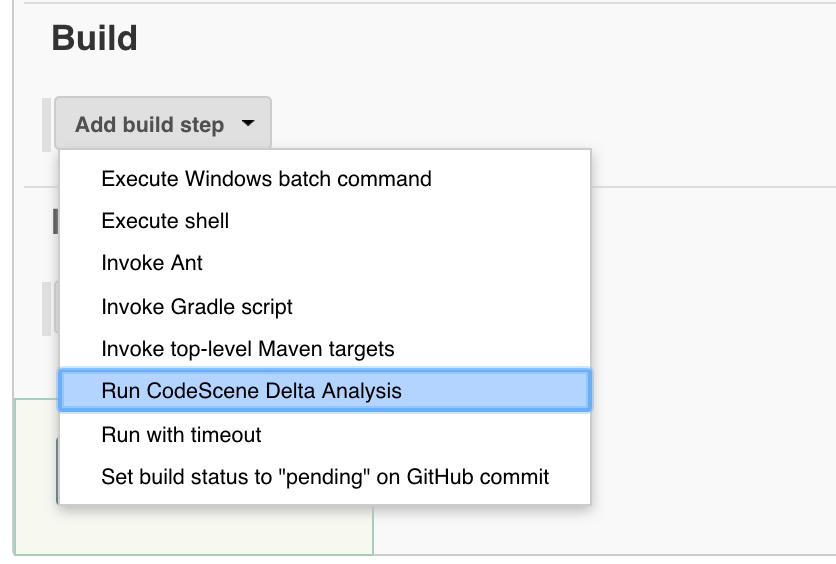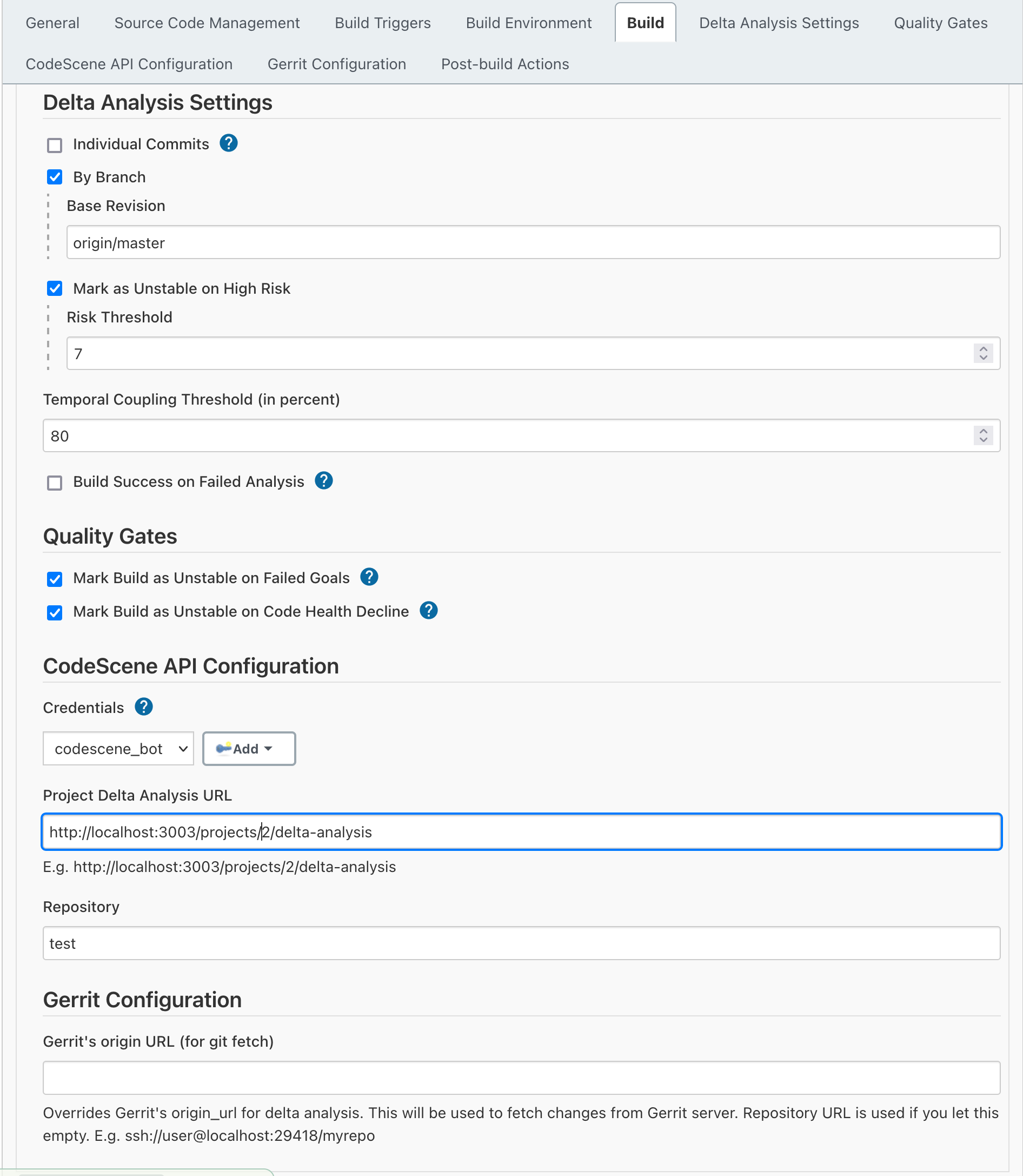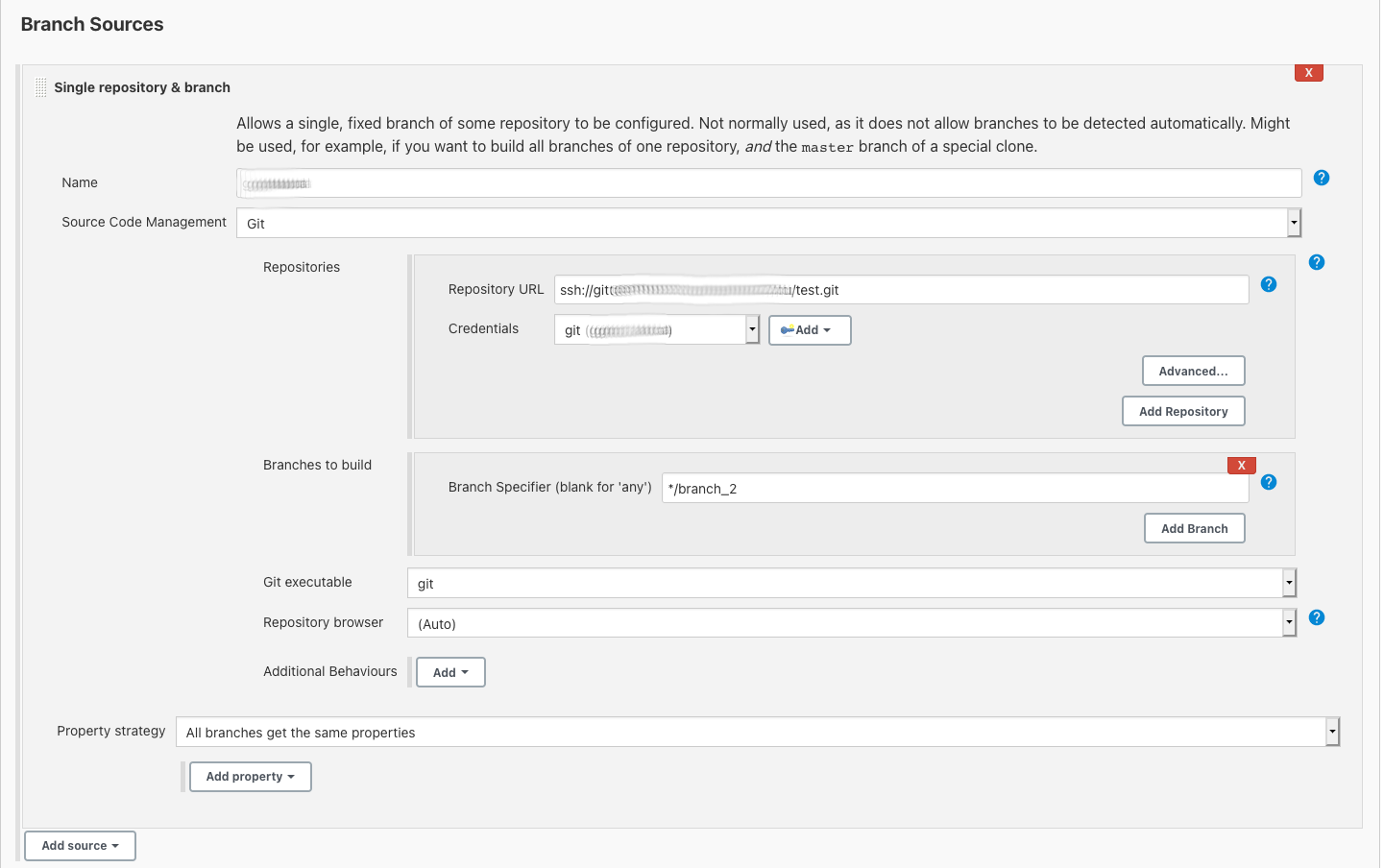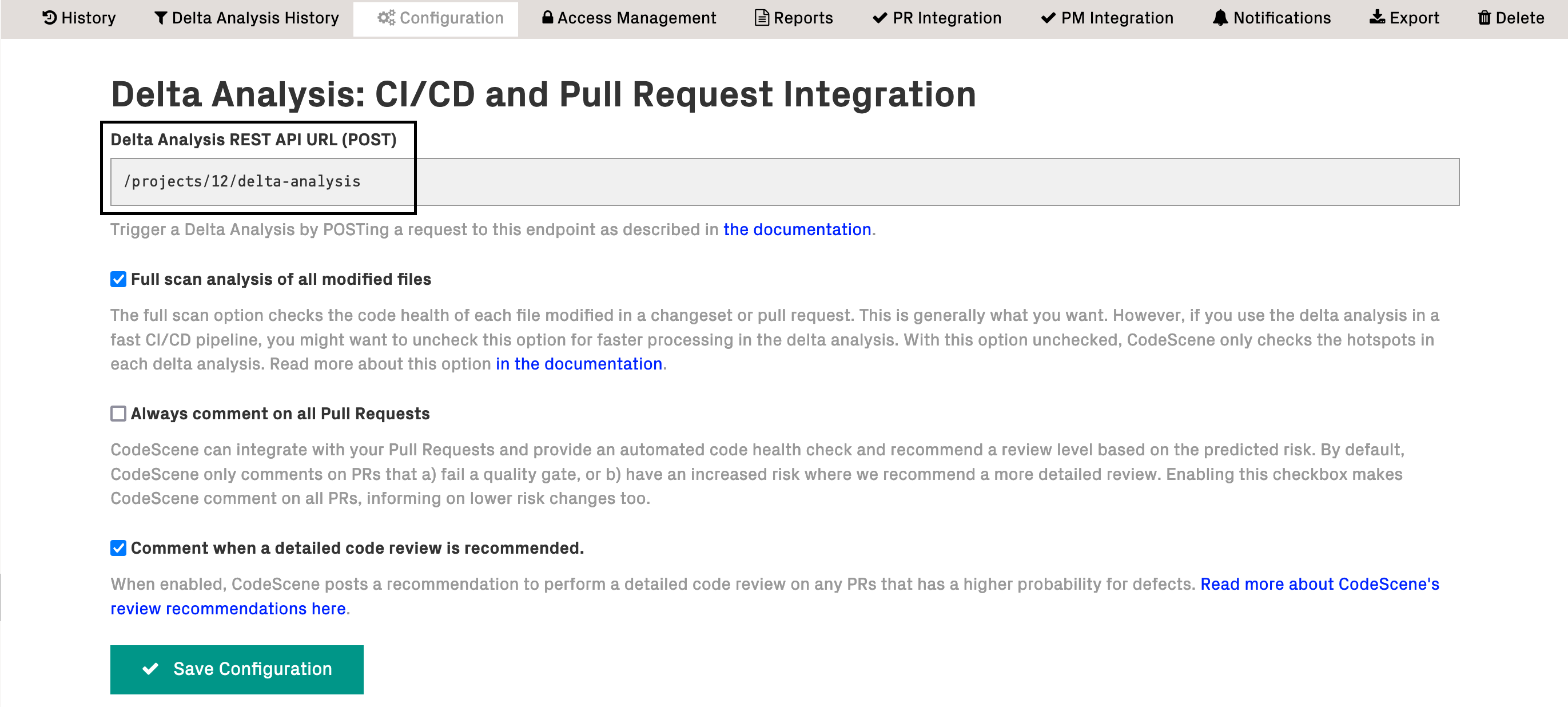The API used by this this plugin will not be supported by CodeScene after version 7.0.5. Rather than using it, we recommend to use the functionality built into CodeScene to integrate automated code reviews in Pull Requests, or to use the CodeScene CLI tool
A jenkins plugin for CodeScene by Empear.
CodeScene identifies and prioritizes technical debt, while at the same time uncovering and measuring social factors of the organization behind the system. The earlier you can react to any potential finding, the better. That’s why CodeScene offers integration points that let you incorporate the analysis results into your build pipeline.
This plugin lets you use CodeScene’s Delta Analysis to:
- Prioritize code reviews based on the risk of the commits.
- Specify quality gates for the goals specified on identified hotspots (see Managing Technical Debt).
- Specify quality gates that trigger in case the Code Health of a hotspot declines.
The risk classification is described in detail in CodeScene's documentation. The value goes from 1 (lowest risk) to 10 (a high risk change). The plugin can be run on either individual commits or a complete branch:
CodeScene's Intelligent Notes concept lets you augment the analysis with your goals and contextual information. For example, you could decide that a hotspot might indeed have a high degree of technical debt, but chose to live with it for now. In that case you would tell CodeScene about your decision but ask the tool to supervise the hotspot so that it doesn't get worse. With the Jenkins plugin, you could then enforce that goal through a quality gate.
As long as everything evolves according to plan, the plugin will report an OK in its green Quality Gate (QG) indication:
However, should one of your goals fail -- e.g. the supervised hotspot grows worse -- then we notify directly in the CI/CD pipeline and mark the build as unstable:
If you don't yet use the Intelligent Notes feature then, well, you really should -- it's a game changer that lets you take on technical debt in a pro-active rather than reactive way. However, there might be other unsupervised hotspots. You can catch a decline in Code Health in that case too by using the second quality gate, "Mark Build as Unstable on Code Health Decline". The two quality gates work well together, and we recommend you enable both.
In addition to the risk classification and quality gates, CodeScene also runs its set of early warning analyses:
The early warnings and risk classification let you prioritize your code reviews and focus your time where (and when) it’s likely to be needed the most. Code reviewer fatigue is a real thing, so let’s use our review efforts wisely.
The recommended way is to install the plugin via Jenkins Update Center (Jenkins -> Manage Jenkins -> Manage Plugins). You can find the latest version in Jenkins plugin repository.
You can build the latest version of plugin by running mvn clean package and installing target/codescene.hpi to your Jenkins manually.
Enable the CodeScene integration by adding a new build step in your Jenkins configuration. Select the option Run CodeScene Delta Analysis.
Enter the required information in the CodeScene Jenkins configuration:
Create a new Jenkins Item Project using Multibranch Pipeline
Add new Branch Source
Define Build Configuration File
Example of my_jenkins_file
pipeline {
agent none
stages {
stage('codescene') {
agent { label 'master' }
steps {
codescene analyzeBranchDiff: true, baseRevision: 'origin/master', credentialsId: '35640731-4c12-4c6b-9106-601aab148a64', deltaAnalysisUrl: 'http://your_code_scene_instance_url:3003/projects/{your_project_id}/delta-analysis', failOnDecliningCodeHealth: false, failOnFailedGoal: false, originUrl: '', repository: 'test'
}
}
}
}
Requirements:
- A user with the role
BOTmust exist in your CodeScene instance. - Specify a
credentialsIdinmy_jenkins_filethat references valid Jenkins credentials (username/password).
CodeScene gives you a number of options that controls the scope of the delta analysis:
- Individual Commits: Check this option to run a delta analysis on each individual commit. When in doubt, make this your default setting.
- By Branch: With this option, CodeScene runs a delta analysis on the difference between the branch you build and the one you provide as reference. Use this option if you want to analyse a whole pull request.
You can also change the defaults for risk threshold and temporal coupling threshold
- Risk Threshold: commits with risk equal or higher than this value will make a build unstable
- Temporal Coupling Threshold: minimum temporal coupling for "Absence of Expected Change Pattern" warning
Finally, you enable the Quality Gates in the configuration too.
The CodeScene API configuration section has to match the information specified inside CodeScene itself and retrievable from the analysis configuration (Project configuration -> Delta Analysis):
API Credentials should be added via jenkins credentials plugin. Check Injecting Secrets into Jenkins Build Jobs for more details.
This is an advanced config useful if you use Gerrit Code Review tool.
In the simplest case, you don't need to set anything in the "Gerrit's origin URL" field:
- If you use the Gerrit Trigger plugin, it sets the
GERRIT_REFSPECjob env variable used by the CodeScene plugin as thechange_refparameter's value sent to the CodeScene Delta Analysis API. - The API also requires the
origin_urlparameter which is by default set to the value of the Repository URL field (see Jenkins job Git plugin config).
In more complex scenarios you can:
- add the
GERRIT_REFSPEC"parameter" to your job config and set it manually when triggering a "Build with parameters". - provide a custom value for the
origin_urlby setting the Gerrit's origin URL field in the job configuration (see the Gerrit Configuration section).
See also the DELTA ANALYSIS WITH GERRIT section in CodeScene on-prem documentation.
- 1.5.8
- Deprecate this plugin
- 1.5.7
- Set target ref when calling the CodeScene API
- 1.5.6
- remove use-biomarkers options, it is now always enabled
- 1.5.3
- Use the updated delta-analysis api, with graceful handling of edge cases on reverted/deleted files in pull requests
- 1.5.2
- Fetch environment variable from last execution step for usage inside pipeline with Multibranch-Pipeline
- 1.5.1
- Introduce a code review of new files added in a commit. This review also serves as a quality gate to detect new content with low code health.
- 1.2.3
- Introduce optional quality gates based on CodeScene's Intelligent Notes.
- 1.1.4
- Reverse the previously added configuration option so that a user explicitly has to allow an analysis failure to pass the build.
- 1.1.3
- Introduce a configuration option to mark builds as UNSTABLE rather than FAILED if a remote CodeScene analysis couldn't be performed.
- 1.1.2
- Add Biomarkers support to auto-detect files that seem to degrade in quality through issues introduced in a changeset - requires CodeScene version 2.4.0 or higher.
- 1.1.1
- 1.1.0
- Use credentials plugin for storing CodeScene API credentials instead of hardcoded username and password. Existing jobs will continue to work, but you won't be able to update job configuration (e.g. change username or password) until you switch to the credentials plugin. Check Injecting Secrets into Jenkins Build Jobs for more details.
- Only required parameters are now set in constructor. Optional parameters are set with setters. Check https://github.com/jenkinsci/pipeline-plugin/blob/c84a9af/DEVGUIDE.md#constructor-vs-setters. Original constructor has been removed!
- Specify mnemonic extension name "codescene" via
@SymbolinCodeSceneBuilder. Check https://github.com/jenkinsci/pipeline-plugin/blob/c84a9af/DEVGUIDE.md#defining-symbols and https://wiki.jenkins-ci.org/display/JENKINS/Structs+plugin for more details. - Add new configuration field for temporal coupling threshold. The new field is set to 80 percent by default. Requires CodeScene 2.0+, otherwise the new settings doesn't have any effect.
- 1.0.1
- Add checksums to built artifacts in GitHub releases
- 1.0.0
- Delta analysis by branch, based on base revision
- Delta analysis by individual commits (new commits not seen in previous jobs)
- "Mark build as unstable" based on risk threshold
You're encouraged to submit pull requests, and to propose features and discuss issues.
Licensed under the MIT License.




